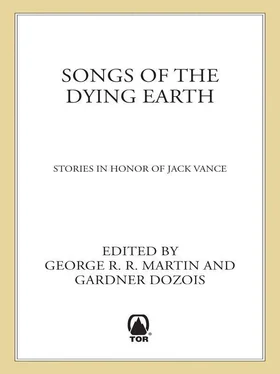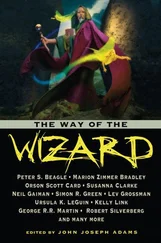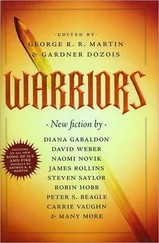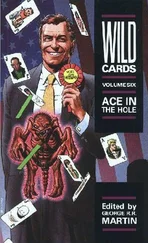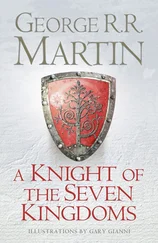Instead, the Twk-man flew at him and thrust his lance point at his nose, but quick as he was, Chimwazle was quicker. His tongue darted out, long and sticky, plucked the tiny rider from his mount, pulled him back wailing. His armor was flimsy stuff, and crunched nicely between Chimwazle’s sharp green teeth. He tasted of mint and moss and mushroom, very piquant.
Afterward, Chimwazle picked his teeth with the tiny lance. “There was only the one,” he decided confidently, when no further Twk-men deigned to appear. “A bowl of hissing eels awaits me. You may remain here, Pooner. See that you guard my cart.”

Lirianne skipped and spun as on she walked. Lithe and long-legged, boyish and bouncy, clad all in grey and dusky rose, she had a swagger in her step. Her blouse was spun of spidersilk, soft and smooth, its top three buttons undone. Her hat was velvet, wide-brimmed, decorated with a jaunty feather and cocked at a rakish angle. On’her hip, Tickle-Me-Sweet rode in a sheath of soft grey leather that matched her thigh-high boots. Her hair was a mop of auburn curls, her cheeks dusted with freckles across skin as pale as milk. She had lively grey-green eyes, a mouth made for mischievious smiles, and a small upturned nose that twitched as she sniffed the air.
The evening was redolent with pine and sea salt, but faintly, beneath those scents, Lirianne could detect a hint of erb, a dying grue, and the nearby stench of ghouls. She wondered if any would dare come out and play with her once the sun went down. The prospect made her smile. She touched the hilt of Tickle-Me-Sweet and spun in a circle, her boot heels sending up little puffs of dust as she whirled beneath the trees.
“Why do you dance, girl?” a small voice said. “The hour grows late, the shadows long. This is no time for dancing.”
A Twk-man hovered by her head, another just behind him. A third appeared, then a fourth. Their spear points glittered redly in the light of the setting sun, and the dragonflies they rode glimmered with a pale green luminescence. Lirianne glimpsed more amongst the trees, tiny lights darting in and out between the branches, small as stars. “The sun is dying,” Lirianne told them. “There will be no dances in the darkness. Play with me, friends. Weave bright patterns in the evening air whilst still you can.”
“We have no time for play,” one Twk-man said.
“We hunt,” another said. “Later we will dance.”
“Later,” the first agreed. And the laughter of the Twk-men filled the trees, as sharp as shards.
“Is there a Twk-town near?” asked Lirianne.
“Not near,” one Twk-man said.
“We have flown far,” another said.
“Do you have spice for us, dancer?”
“Salt?” said another.
“Pepper?” asked a third.
“Saffron?” sighed a fourth.
“Give us spice, and we will show you secret ways.”
“Around the tarn.”
“Around the inn.”
“Oho.” Lirianne grinned. “What inn is this? I think I smell it. A magical place, is it?”
“A dark place,” one Twk-man said.
“The sun is going out. All the world is growing dark.” Lirianne remembered another inn from another time, a modest place but friendly, with clean rushes on the floor and a dog asleep before the hearth. The world had been dying even then, and the nights were dark and full of terrors, but within those walls it had still been possible to find fellowship, good cheer, even love. Lirianne remembered roasts turning above the crackling fire, the way the fat would spit as it dripped down into the flames. She remembered the beer, dark and heady, smelling of hops. She remembered a girl too, an innkeeper’s daughter with bright eyes and a silly smile who’d loved a wandering warfarer. Dead now, poor thing. But what of it? The world was almost dead as well. “I want to see this inn,” she said. “How far is it?”
“A league,” the Twk-man said.
“Less,” a second insisted.
“Where is our salt?” the two of them said, together. Lirianne gave them each a pinch of salt from the pouch at her belt. “Show me,” she said, “and you shall have pepper too.”

The Tarn House did not lack for custom. Here sat a whitehaired man with a long beard, spooning up some vile purple stew. There lounged a dark-haired slattern, nursing her glass of wine as if it were a newborn babe. Near the wooden casks that lined one wall a ferret-faced man with scruffy whiskers was sucking snails out of their shells. Though his eyes struck Chimwazle as sly and sinister, the buttons on his vest were silver and his hat sported a fan of peacock feathers, suggesting that he did not lack for means. Closer to the hearth fire, a man and wife crowded around a table with their two large and lumpish sons, sharing a huge meat pie. From the look of them, they had wandered here from some land where the only color was brown. The father sported a thick beard; his sons displayed bushy mustaches that covered their mouths. Their mother’s mustache was finer, allowing one to see her lips.
The rustics stank of cabbage, so Chimwazle hied to the far side of the room and joined the prosperous fellow with the silver buttons on his vest.” How are your snails?” he inquired.
“Slimy and without savor. I do not recommend them.”
Chimwazle pulled out a chair. “I am the Great Chimwazle.”
“And I Prince Rocallo the Redoubtable.”
Chimwazle frowned. “Prince of what?”
“Just so.” The prince sucked another snail, and dropped the empty shell onto the floor.
That answer did not please him. “The Great Chimwazle is no man to trifle with,” he warned the so-called princeling.
“Yet here you sit, in the Tarn House.”
“With you,” observed Chimwazle, somewhat peevishly.
The landlord made his appearance, bowing and scraping as was appropriate for one of his station. “How may I serve you?”
“I will try a dish of your famous hissing eels.”
The innkeep gave an apologetic cough. “Alas, the eels are…ah…off the bill of fare.”
“What? How so? Your sign suggests that hissing eels are the specialty of the house.”
“And so they were, in other days. Delicious creatures, but mischievous. One ate a wizard’s concubine, and the wizard was so wroth he set the tarn to boiling and extinguished all the rest.”
“Perhaps you should change the sign.”
“Every day I think the same when I awaken. But then I think, the world may end today, should I spend my final hours perched upon a ladder with a paintbrush in my hand? I pour myself some wine and sit down to cogitate upon the matter, and by evening I find the urge has passed.”
“Your urges do not concern me,” said Chimwazle. “Since you have no eels, I must settle for a roast fowl, well crisped.”
The innkeep looked lachrymose. “Alas, this clime is not salubrious for chicken.”
“Fish?”
“From the tarn?” The man shuddered. “I would advise against it. Most unwholesome, those waters.”
Chimwazle was growing vexed. His companion leaned across the table and said, “On no account should you attempt a bowl of scrumby. The gristle pies are also to be avoided.”
“Begging your pardon,” said the landlord, “but meat pies is all we have just now.”
“What sort of meat is in these pies?” asked Chimwazle.
“Brown,” said the landlord. “And chunks of grey.”
“A meat pie, then.” There seemed to be no help for it.
The pie was large, admittedly; that was the best that could be said for it. What meat Chimwazle found was chiefly gristle, here and there a chunk of yellow fat, and once something that crunched suspiciously when he bit into it. There was more grey meat than brown, and once a chunk that glistened green. He found a carrot too, or perhaps it was a finger. In either case, it had been overcooked. Of the crust, the less said, the better.
Читать дальше
